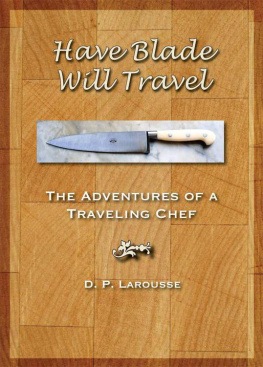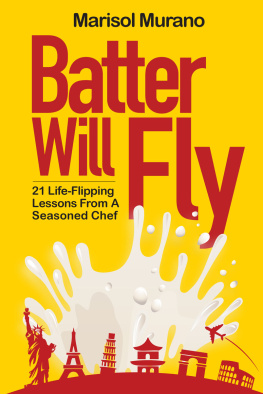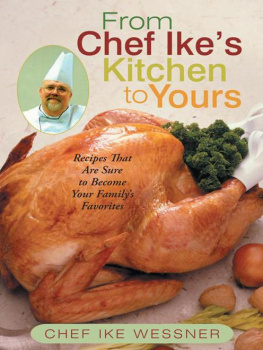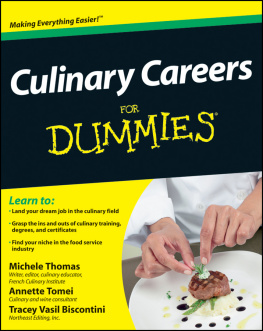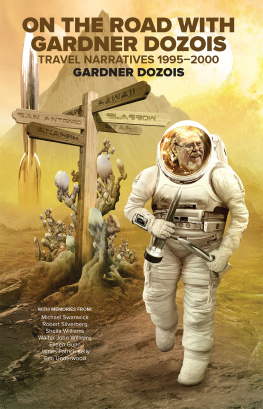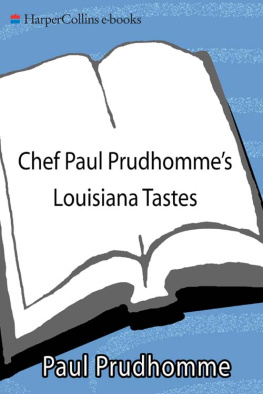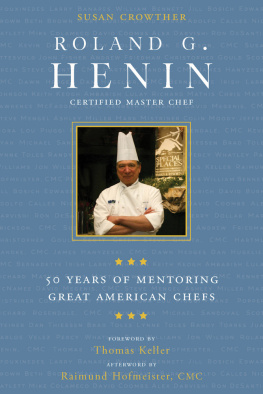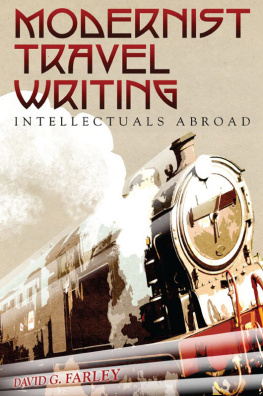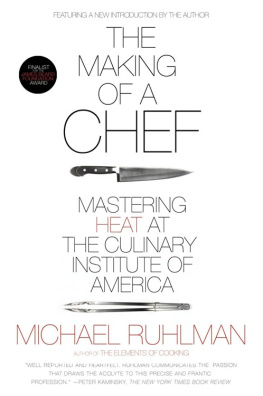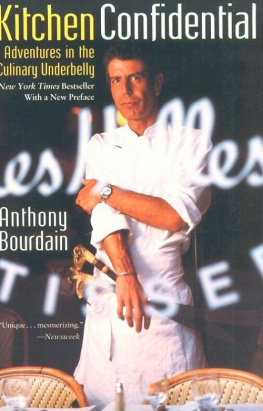Table of Contents
10.

Have Blade, Will Travel
The Adventures of a Wandering Chef
by David Paul Larousse
Pour Gayla, l'ange terre qui s'est enfui.
(For Gayla, the earth angel who got away.)
David Paul Larousse
Portable: 828.989.4990
Introduction
Our lives are not in the hands of the gods, they are in the hands of our cooks. Lin Yutang
Elizabeth and I were building a vinaigrette. Earnest as a ten-year-old can be, she added the ingredients to the blender as I directed. In the midst of this production, a boy, about four-feet tall strode into the kitchen, and walked directly up to the counter where we were working. I like eggplant, he announced. Well, eggplant had nothing to do with anything that was going on in the kitchen at that moment, but it was as good a self-introduction as I had ever heard from anyone of that age. Elizabeth introduced us formally. The boys name was Jasper he was five-and-a-half years old and the son of a neighbor. And he was obviously possessed of a keen eye for the action in the kitchen. In fact, he was an incarnation of my very own self at that very same age, more years ago than I cared to admit.
Jasper joined in our dinner production, mostly in the form of adding a delightful effervescence to the already lively ambiance of the kitchen. Elizabeth was an excellent assistant, and we continued moving our dinner along. Our menu was typical bourgeois fare Roast Chicken, Roast Yukon Gold Potatoes, a vegetable mlange, an extraordinary gravy (my Inner Saucier was in peak form that evening), green-leaf-lettuce salad with tomato-and-cucumber, and of course, a fine vinaigrette. Eventually the three of us, along with her parents, sat down to a splendid repast.
Over the years I have worked as a culinarian, Ive seen restaurant food go through many changes. Professional curiosity has led me to examine and evaluate every new variation down to the sheen in the sauce, the radicchio shards pointing up at my chin, and the herb or spice garnish dusted around the edge of the plate. Many of these changes have been for the better, and I have often delighted at some of the work I have seen and sampled. But in some cases, self-anointed chefs have played with their food in absurd ways, clearly in pursuit of the sort of media attention that pulls in customers and makes celebrities. This is not what food and cooking are about at least not for me. And the more I see such changes, the more I move back to the simple and uncomplicated, the fundamental and the unadorned. As a friend and fine cuisinire Polly Legendre once said to me, If you cant make a fabulous dish with five ingredients or less, you have no business being in the kitchen.
In a bizillion years, I would never have imagined that I would end up a classicist in matters of gastronomy. But it is where I came from where we all came from, actually and as a matter of personal evolution, it is where I continue to retreat. Every time I experience a meal built upon flash and ostentation, I am reminded of the time-tested dicta that underlie culinary creativity as Paul Bocuse has said, La meilleur cuisine est le plus simple. (The best food is the simplest food.)
And so, I shall make my case for classic traditions as simply and as thoroughly as I can. And if I awaken in a single reader, especially in some aspiring young culinarian, an appreciation of time-honored styles and a commitment to keeping them alive and passing them on, then I will have accomplished my goal.
DPL, July 2015
Chapter 1
The Great Egg-Drop-Soup Calamity of 1956
When I was a little sprout, just a year or two of age, I romped and pranced and played with wild abandon on the open fields and square grass patches of my neighborhood world. On summer weekends the family drove to grandmothers house near the sea, where someone turned on a garden hose and I would run and slide across the water-soaked grass lawn like a wild urchin. The world was one big, plump, wide-open oyster, and I was going to romp and play in it forever and ever.
A few years later, on the occasional Sunday evening, Grandma would invite the family for dinner. She was a celebrated family hostess, as grandmothers ought to be, and known for an excellent kitchen. While awaiting the evening meal, the grown-ups would sip scotch-on-the-rocks and whiskey-sours, and dip celery sticks, broccoli flowerets and cut radishes into sour-cream-onion-soup-mix-dip the hip appetizer of the day. Then we would all sit down to a very fine dinner.
One evening, in the midst of the meal, I asked out loud, Grandma, is there white wine in this chicken? Conversation halted abruptly and all eyes were upon me. Why yes, there is young man, she replied. How did you know that? Of course I knew nothing about wine at that age, yet somehow I understood what wine tasted like when used in cooking.
That was one of the first times I had shown a special insight into food and how it is prepared and what goes on in the kitchens of this world. Later on, there were other clues. One night, while my Mom was tucking me into bed, I announced matter-of-factly that I was going to invite Barbara Deutchmeyer, a neighborhood girl from my Kindergarten class, out to dinner. This proved to be another conversation-stopper, because what do you say to a five-year-old who intends to start taking young girls out for restaurant dinners?
The very thought inside my little crew-cut-topped head, of inviting this lass to join me for a restaurant dinner date set my heart to pound and my face to flush. It was better than flirting with Kublai Khans concubines; better than sitting next to Benjamin Franklin the night Antoine Parmentier presented a twenty-item pomme de terre feast at his Paris home; better than joining Charles Rector, Diamond Jim Brady, John Phillip Souza, Sam Schubert, and Adolphus Busch, one night at Delmonicos, as they they feasted on Filet de Sole, Marguery . Years later I would grin in bemused amazement at the audacity of my inner five-year-old Casanova who had the extraordinary ingenuity and initiative to invite a pretty, young lass out to dinner. Yet at the time it seemed a perfectly normal and correct thing to do, and with a matter-of-fact determination I was simply going to do it.
Barbara Deutchmeyer and I never did go out on a date for dinner or otherwise. There was no chemistry and little attraction and besides, there were so many lovely young lasses whom I wanted to get to know. But what had made my plan all the more audacious was that I had never so much as been inside a restaurant, let alone gone out on a date. Fortunately, Mom handled the situation with her characteristic tact. She calmly explained that I was a little too young for such an undertaking and would have to wait a few more years. That was just fine with me, because I already knew there would be plenty of time later on to take young lasses and lovely ladies out for dinner.
Two years later I experienced my first restaurant meal, a memorable evening that became an experience forged forever into my memory, and which became a signal event in what would be my future career. I remember the evening in minute detail, thanks in large part to my sense perceptions untainted by alcohol, coffee, tobacco, and the like thus sharp and fresh and fully able to record every aspect of the experience. The memory resonated so strongly, that many years later, as I searched my soul for my true calling, it confirmed the fiery passion I felt for the cooking craft from my earliest days.
The restaurant was Ho King, and it was located at the Lincoln Shopping Center near the middle of town in Oceanside, on Long Island, New York. The aromas struck me the instant we came through the door, an olfactory assault blending deep-fried pork, candle wax, steamed rice, oolong tea, vinegar, and soy sauce. The five of us were greeted promptly and ushered to a booth with wide, dark-green seats covered with glossy, clear plastic. My Mom and I sat on one side, my Dad and sister on the other. The cushion was big and soft, and I sank down into it so deeply that I had to stretch my neck up and out so I could see the goings-on.
Next page
